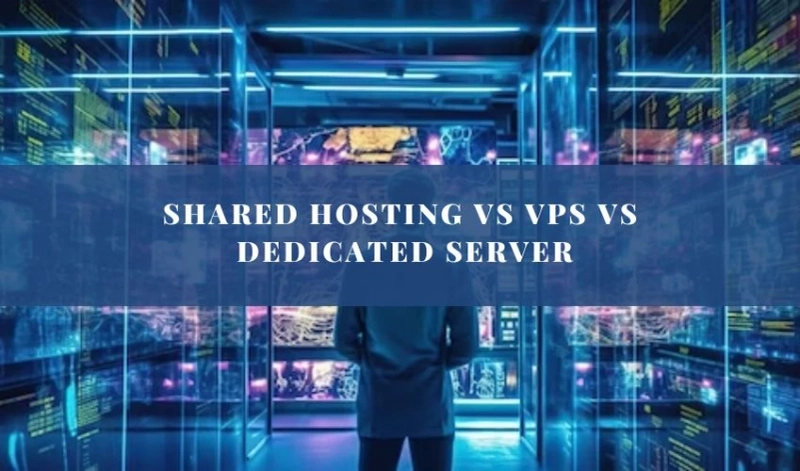Shared Hosting vs Vps vs Dedicated Server, having a strong online presence is vital for businesses and individuals alike. Whether you’re running a small blog, an e-commerce website, or a large enterprise, your choice of web hosting can significantly impact your online success. Shared hosting, Virtual Private Servers (VPS), and dedicated servers are three common options that cater to a wide range of hosting needs. In this comprehensive guide, we’ll explore the differences and benefits of shared hosting, VPS, and dedicated servers to help you make an informed decision.
Shared Hosting: The Budget-Friendly Option
Shared hosting is often the entry point for individuals and small businesses venturing into the online world. It’s like renting a tiny space in a large building, where multiple tenants share resources like space, electricity, and maintenance costs.
Affordability: Shared hosting is the most budget-friendly option. Hosting providers distribute server resources among multiple users, resulting in lower costs.
Ease of Use: It’s incredibly user-friendly. You don’t need to be a tech guru to get your website up and running. Most providers offer user-friendly control panels, like cPanel, to simplify site management.
Technical Maintenance: Hosting providers handle server maintenance, so you don’t have to worry about updates, security, or performance optimization.
Resource Limitations: The major drawback of shared hosting is the limited resources. Since many users share the same server, your website’s performance can be affected during peak times.
Security Concerns: Shared hosting can be less secure, as your website shares the server with others. If one site on the server is compromised, it can potentially impact others.
Scalability: As your website grows, you might outgrow shared hosting. It’s not suitable for high-traffic or resource-intensive websites.
VPS (Virtual Private Server): The Best of Both Worlds
A Virtual Private Server is like having your own apartment in a multi-story building. While you still share the physical hardware with other users, VPS hosting creates isolated virtual environments for each user, offering a higher degree of control and security.
Resource Allocation: VPS hosting provides a dedicated portion of server resources for your website. This means your site’s performance remains stable and unaffected by other users on the server.
Customization: You have more control over your server environment. You can install custom software, configure settings, and even choose your operating system.
Cost-Effective Scalability: VPS hosting is scalable. You can easily upgrade or downgrade your plan to accommodate changing traffic levels or resource requirements.
Enhanced Security: VPS hosting offers best security than shared hosting. Your virtual environment is isolated, reducing the risk of your site being affected by others.
Managed or Unmanaged: Depending on your technical expertise, you can opt for managed or unmanaged VPS hosting. Managed plans come with support, while unmanaged plans require you to handle server administration.
Technical Knowledge: VPS hosting may require a bit more technical know-how compared to shared hosting, but it’s still accessible for most users.
Dedicated Server: The Powerhouse Solution
A dedicated server is like owning a standalone house, giving you complete control over the property. In this scenario, the entire server is yours to use as you see fit.
Full Resource Control: Dedicated servers offer you the entire server’s resources. You won’t have to share CPU, RAM, or storage with anyone else.
High Performance: With dedicated resources, your website will perform at its best, even during traffic spikes.
Complete Customization: You have the freedom to configure the server as per your specific needs, making it suitable for hosting multiple high-traffic websites or resource-intensive applications.
Security: Dedicated servers provide top-tier security, as you’re the sole user. You can implement advanced security measures to protect your data.
Technical Expertise Required: Managing a dedicated server demands a strong technical skill set. If you’re not comfortable with server administration, you’ll need to hire a sysadmin or opt for managed dedicated hosting.
Cost: Dedicated servers are the most expensive hosting option due to the exclusive use of resources and the associated maintenance costs.
Making the Right Choice
The choice between shared hosting, VPS, and dedicated server hosting ultimately depends on your specific needs and resources. Here are some guidelines to help you decided:
Shared Hosting: Ideal for beginners, personal blogs, and small websites with low traffic. It’s the most budget-friendly option but comes with resource limitations.
VPS Hosting: A versatile option that suits small to medium-sized businesses and growing websites. It offers a good balance of control, performance, and cost.
Dedicated Server Hosting: For large businesses, e-commerce sites, or applications with high resource demands. It provides complete control and performance but requires a higher budget and technical expertise.
Shared Hosting vs Vps vs Dedicated Server, Consider your website’s current and future requirements, budget, technical skills, and the level of control and security you need when making your decision. Hosting providers often offer various plans within these categories, so you can find the one that best fits your needs.
Conclusion
Shared Hosting vs Vps vs Dedicated Server, selecting the right hosting solution is a critical decision that can impact your website’s performance, security, and scalability. Understanding the differences between shared hosting, VPS, and dedicated servers is the first step towards making an informed choice. Evaluate your unique requirements and resources, and choose the hosting option that aligns best with your goals and budget.



